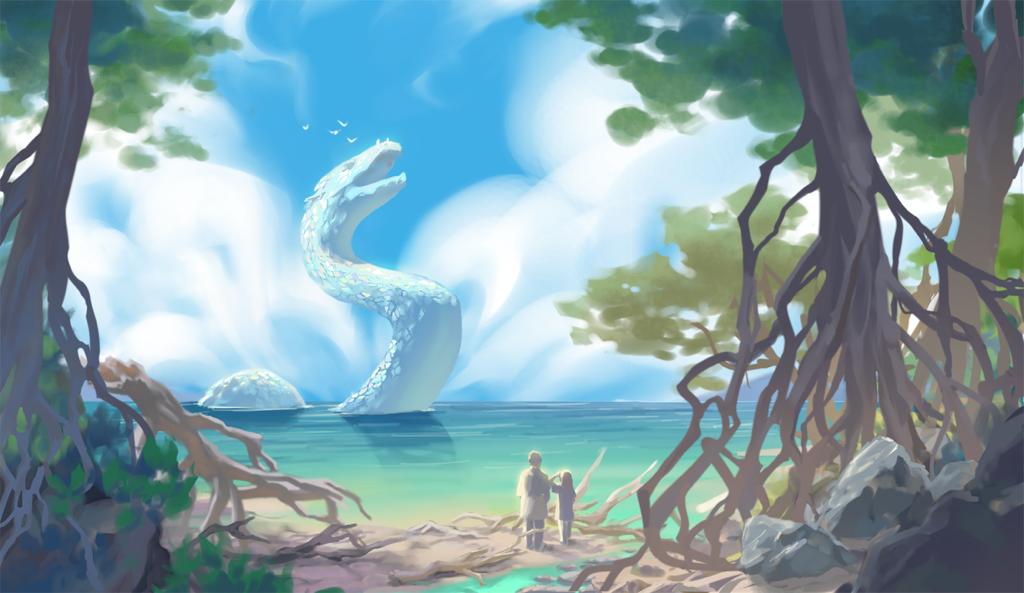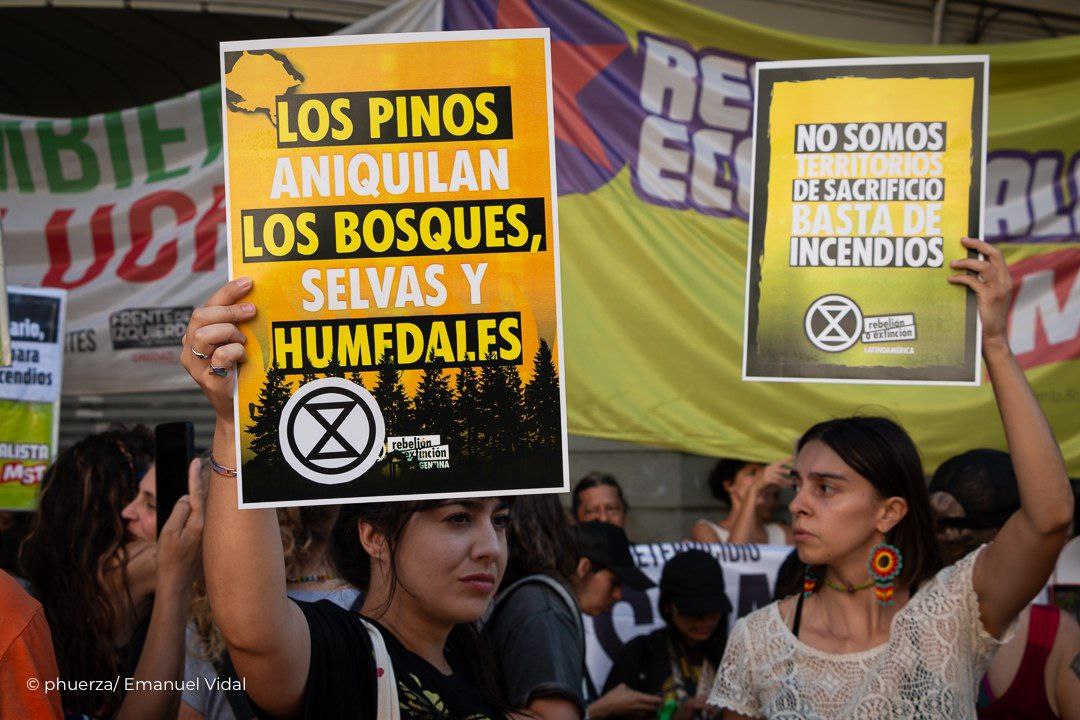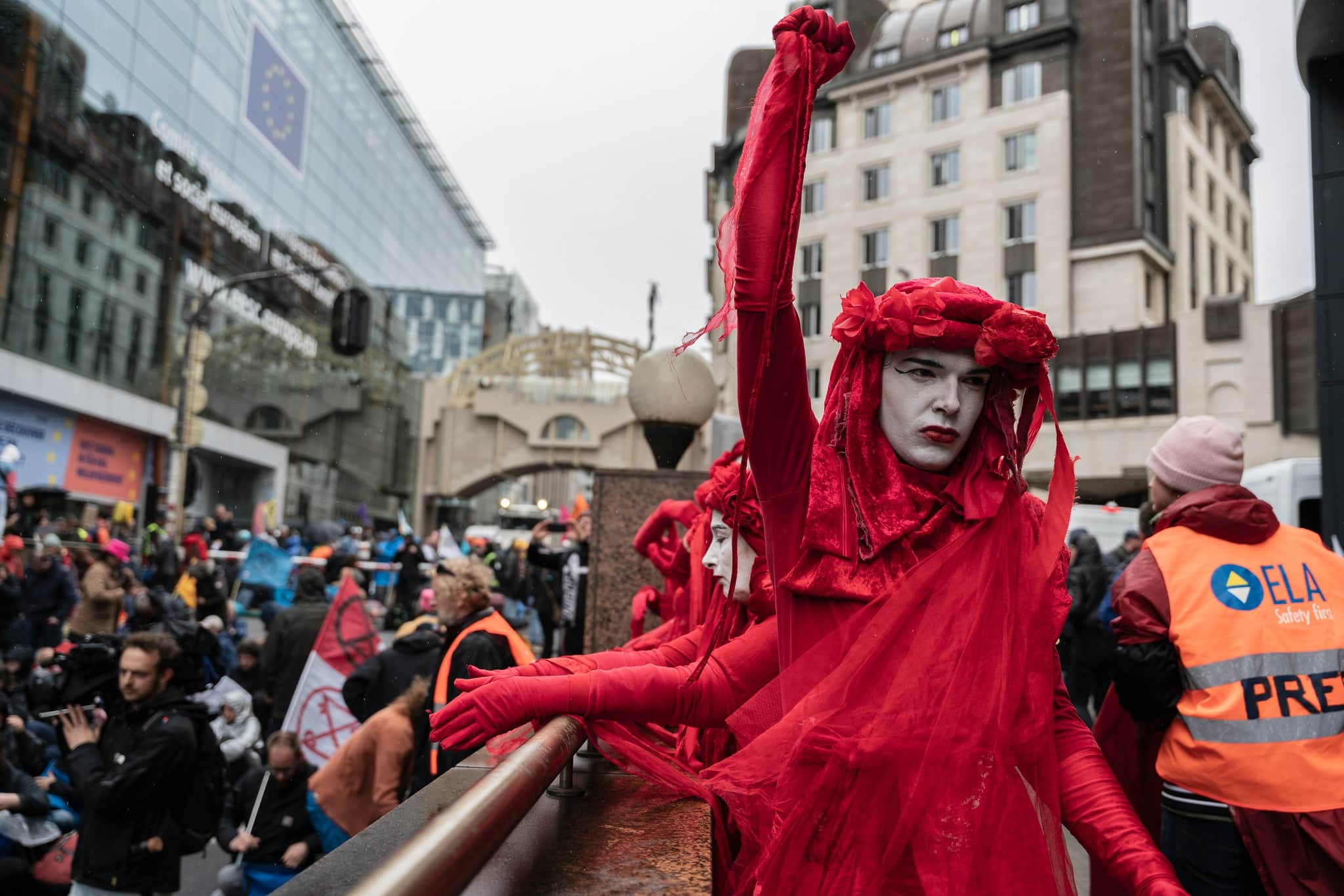The XR Wordsmiths' 2021 Solarpunk Storytelling Showcase was Extinction Rebellion’s first global short story contest for all ages.
The project rides the wave of the Solarpunk movement and grew from the belief that imagining a better future is the first step towards creating it.
The power of collective and radical imagination helps to inspire action against unjust, destructive futures by actively building towards the future we want to see.
The 2023 Showcase is live and ready for your entries! Follow the link here to discover how you can get involved, or email the team at [email protected] to find out more.
The following story - "Gabby's First Kiss" was a winning entry in the "19 & over category", and was written by Joe Tankersley, with original artwork by Rita Fei.
-------------------------------------------------------------------------------------------
Gabby's First Kiss
Gabby nearly knocked her mother over as she rushed through the kitchen and out the front door. Outside, she paused to look over the horizon. Her home, like all the homes in Bahía del Paraíso, sat high in the air; protected from the floods that were a regular part of life in their small coastal community. From her perch, she could easily see all the way to the bay. In the early morning sunlight, the mangroves along the water’s edge glowed as if they were on fire. Beyond them, the crystal-clear blue water sparkled.

Illustration for XR Wordsmiths by Rita Fei
There had been a storm the night before. Not a very big one. The kind that Pipo dismissed as nothing more than a pequeño mosquito before going back to playing dominos with Uncle Eduardo. But even minor storms could leave behind unexpected treasures, so it was definitely worth checking out.
She skipped along the boardwalk that connected all the houses in the village. Gabby’s Tía Maria, the community’s designer, had adamantly opposed the flying walkways. She argued that “flimsy bridges” would completely compromise the integrity of her carefully planned resilient design.
Everyone understood the importance of strong homes, but these were practical people. They argued that it made no sense to climb down forty-five steps and then right back up just to visit the next-door neighbor. "What about the old people?" they had cried. "Or the mothers with little children?"
Tía Maria finally gave in, but only after they had come up with a design that made it possible to detach the bridges whenever a hurricane approached. Gabby loved the bridges. Scampering from house to house made her feel like a creature living high in the trees of an exotic jungle.
Gabby had recently turned thirteen. Like so many girls her age, she had experienced a growth spurt that left her tall and gangly. She navigated the swinging walkways with the loose grace of a child on the brink of becoming a confident young woman for whom every day would be a new adventure.
Her partner in those adventures was Danh. Even though they were the same age, she was nearly a head taller than him. Where she was lean and willowy, he was solid and compact. But he was the only boy her age who could keep up with her. They never missed the chance to search for treasures after a storm.
Standing on the deck that surrounded Danh’s house, she peered inside his open bedroom window and called out quietly, “Danh, you awake?”
“’Bout time, em gái,” his booming response came from behind.
Startled, she spun around to see Danh, floating on his hoverboard, just above her head. “Jerk,” she said, and swatted playfully at him.
He deftly maneuvered the board out of reach and smiled.
“Race you down,” he challenged and then disappeared as he sent the board into a steep dive.
Gabby ran for the stairs. She hit every third step on the way down, getting to the bottom as fast as she could, where a smirking Danh leaned casually against the rail.
“You cheat,” she complained.
“You just hate that you’re too klutzy to fly a board.”
“I can still beat you in a fair race,” Gabby shouted suddenly. She dashed off toward the water.
Danh watched her go and then hopped on his board. It didn’t take him long to catch up. He slowed to match her pace, and the two of them followed the paths that zigzagged through the parklike greenspace that separated the homes from the bay.
When they finally reached the beach, Gabby dropped to the sand, out of breath. Danh circled her twice before stepping off the board. The board idled by his side, ready to follow wherever he went. After a few deep gulps of air, Gabby sat up and surveyed the beach.
“I already did a zoom-by. Nothing interesting,” Danh offered.
“Bummer,” Gabby replied.
That was life as a storm pirate. Most of the time you only found little odds and ends, usually from the homes destroyed when the old barrier islands disappeared. Sometimes you got lucky and scored major treasure. Earlier in the summer, after a particularly big storm, they had discovered an ancient-looking log floating just offshore. Gabby’s mother told them it looked like part of a Bodhi tree that might have been carried by the storm all the way from the Ivory Coast of Africa.
They had debated long and hard before deciding what to do with their newfound treasure. It was a point of pride among the community to reuse everything, even trash blown in by the storms. The village Remakers repurposed the found objects into works of art, benches, and even playground structures that dotted the village.
Danh had imagined the log would make an impressive totem pole, but Gabby argued for something useful. In the end, they had compromised. With the help of Danh’s dad, the best carver in the village, they turned the log into a bench with an intricately detailed scene telling the story of the Bodhi tree.
Even though they didn’t expect to find anything nearly as exciting today, they still walked the beach. The tide was going out, so they wandered among the mangroves—primordial trees with twisted roots dipping in and out of the water. Gabby and Danh meandered along until they came to the village’s picnic pavilion. Their bench was just beyond, tucked away in a stand of tall bamboo. They sat down on the bench, close enough that their knees touched. The feeling sent a tiny tingle up Gabby’s spine.
“So, whadya doing today?” she asked.
Danh, apparently completely unaware of the physical tension in the air, replied nonchalantly, “Working on one of your aunt’s bio-digester stations.”
Gabby laughed. “I warned you about asking Tía Maria to be your mentor. Once she gets hold of you, there’s no getting away.”
Danh pulled a handful of leaves off the bamboo growing next to the bench. He began weaving them together as they talked. “No poop shall go unscooped.”
“Eh, gross,” Gabby hit Danh’s knee with hers. “Now you’re just trying to be disgusting.”
Danh finished twisting the leaves together and held up an intricately woven bamboo ring. He handed it to Gabby and said, “All part of the great circle of life, em gái.”
She took it from him and just stared at it. What was this supposed to mean? Was Danh giving her a ring? Or was it just another one of his goofy jokes?
“So, what you up to today?” Danh asked.
“Aqua harvest with Mom.” Gabby’s mother managed the community’s aquafarm. It was was one of the village’s most successful projects, providing food for the residents and a source of income.
The water in the bay was cleaner than it had been in over a hundred years. With a little help from local marine biologists, it had been easy to re-establish the oyster and scallop beds and bring back the fish and shrimp populations. The return of the seafood harvests was a reminder of what had brought many of Gabby’s and Danh’s ancestors to this coast originally. Today, that natural bounty was enhanced by the latest sustainable aquaculture methods, and the village was once again a prime supplier of fresh seafood to the surrounding communities.
Working with her Mom, Gabby could earn badges in marine biology and aqua-ag. She thought she might even do a little marine science one day. For now, she mainly liked hanging out with her mother.
Seafood was just one of the community’s agricultural bounties. There were box gardens that lined the community pathways where anyone could pick a handful of herbs to cook, small plots near every house, and even a state-of-the-art aeroponics greenhouse. Inside the greenhouse, vegetables literally grew in the air, their bare roots hanging down like stringy hair. Between the year-round warm weather and cutting-edge agriculture technology, the community produced more than enough food to feed itself and to send to nearby markets.
“Oh, hey. S’posed to ask if you want to come to Pipo’s birthday party on Friday. He’s turning ninety-five, so Mom and Tía Maria are going all out.”
“For sure,” Danh exclaimed. “I mean, if it’s cool with you and all.”
Gabby tried to respond nonchalantly. “Whatever, it’s nice to have somebody my age around, you know. They may even make ropa vieja. It’s Pipo’s favorite and Mom said she knew you liked it.”
“With real beef? Last time your mom made that, I pigged out. Kinda surprised she’d invite me back.”
“Oh, she thinks you’re special.” Gabby smiled.
In fact, Sophia and Tía Maria had taken to referring to Danh as Gabby’s “special friend.” Gabby wasn’t sure how she felt about that. Oh, she knew their relationship was way different, but that didn’t mean she wanted her mother to be broadcasting it to everyone.
They spent the next few minutes sitting in silence, something they often did. At first these pauses had felt awkward, but lately Gabby had realized that they were special moments—sharing the natural beauty of this place they were so lucky to call home.
Pipo, out for his morning walk, interrupted their reverie. He rarely missed a day and always wore the same outfit—a perfectly pressed guayabera shirt, linen slacks, and his trademark Panama hat. He stopped when he saw them.
“Why are you niños not in school?” he demanded.
Gabby blushed and tried to explain to him, for the hundredth time, that it was not like the old days when sitting in a classroom was the only place you could learn.
When she had finally finished her explanation, Pipo shook his head in bewilderment. “Come walk with me, nieta.”
Gabby gave Danh a quick look and got up. “So, see you Friday, here in the park.”
“It’s a date,” he replied, hopping off the bench. When he realized what he had said, he stammered quickly, “Gotta fly. Got poop to scoop.” With that, he jumped on the hoverboard and zipped off.
She watched him disappear. A voice in her head was shrieking: A date? Is that really what he had said? She wasn’t sure if she was scared, excited, or both. She was so distracted that she didn’t even notice that Pipo had continued his walk without her.
She ran to catch up and took his hand as they walked toward the shore. Pipo began to reminisce. Walking with one of his grandchildren and telling them stories of the past was his favorite thing to do. Gabby was frequently his audience, and she had heard most of his stories many times.
“You know, Gabriela, we used to live right here on this very spot. Our home wasn’t fancy, but it had been in our family for seven generations, ever since our people first came here to fish.
Then came the summer of the great storms. Six hurricanes in less than three months. It seemed like we spent all our time getting ready for a storm or cleaning up after one; sometimes doing both at the same time. The last storm, the biggest one of all, hit right here. The entire village washed away. Destruido. Your abuela cried and cried for days.”
The thought of Gabby’s grandmother losing everything made her so sad every time she heard this story, even though she knew it had a happy ending.
Over the years, life after the storms had developed into a predictable pattern. First came the clean-up, sometimes taking weeks or months, then the insurance companies and the government would help them rebuild. But this time the insurance companies didn’t come. They said there had been too many storms and they were out of money. The state’s catastrophe fund was empty, and there were no funds available from the federal government. For the first time, the residents didn’t know how they were going to rebuild.
That’s when Tía Maria came home. She had been working up north as an urban planner. Under her leadership, a group of homeowners approached the city with a bold plan. In exchange for assistance in building new homes, the citizens would turn over their land along the shore. Everyone agreed that the old ways weren’t going to work anymore, especially as the sea levels continued to rise and the warmer ocean waters spawned more violent storms.
After months of negotiations, the officials learned what Gabby’s family had long known; you don’t argue with Tía Maria. And that was how Bahía del Paraíso was born.
In exchange for the coastline property, the city gave the residents vacant farmland next to the former village. The land—long ago over-farmed and abandoned—was considered worthless. But when Tía Maria got her hands on it, she got to work building a world class resilient village.
In just five years, the community reached their goal of having a zero-carbon footprint. In fact, they had a net positive effect on the environment. Those improvements meant that the residents were healthier and happier.
Important people from around the world came to visit them now. The United Nations had even designated Bahía del Paraíso a sustainable world site, and Tía Maria was always being invited to important conferences to tell their story.
Pipo stopped walking. Gabby knew they had reached his favorite spot on the beach. Thirty yards offshore, an enormous, brightly colored sea dragon rose out of the water. The dragon’s scales were made from ceramic tiles, salvaged from Pipo’s old home. Tiles that Gabby’s ancestors brought all the way from Cuba.
Gabby thought it was pretty neat that something from her family’s past was now part of her future. What was even cooler to a thirteen-year-old was that the Remakers had rigged the dragon to use bio-gas to breathe real fire. Of course, Tía Maria only allowed them to light it on special occasions.
Pipo’s birthday would be one of those special occasions. Gabby imagined the scene. The dragon that represented her family, breathing fire under a star-filled sky, moonlight reflecting off the water. It just might be the perfect time and place for a first kiss.





